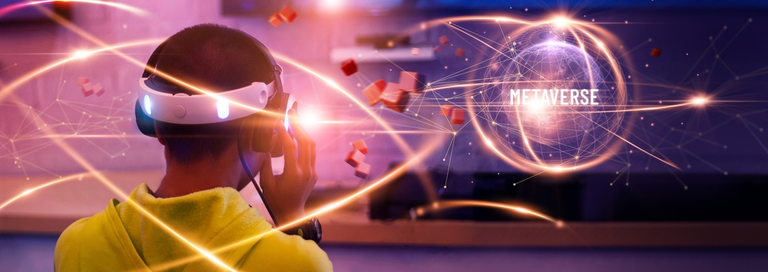Metaverse is a term that has captured the imagination of both technologists and marketers, and describes a burgeoning virtual platform that is accessible to everyone. Envisioned as a collective virtual shared space, it is created through the convergence of virtually-enhanced physical reality, augmented reality (AR), and the internet. This digital realm provides an immersive experience in which users can interact with computer-generated environments and other users. As technologies such as the Metaverse move from Web2 to Web3, online experiences will become more three-dimensional and immersive. This change will not only enhance the digital environment, but also transform the way we interact with digital content, making it more interactive and engaging. Advances in virtual reality (VR) technology will play a pivotal role in this transformation, leading to improved virtual influencers, virtual events, and content, thereby creating new opportunities for connection across various touchpoints in the digital world. I am.
The potential of the metaverse in digital marketing
The Metaverse ushered in a new era of digital marketing, providing a realm where immersive, interactive, and personalized campaigns can thrive. As we move from Web2 to Web3, the Metaverse has emerged as a key enabler of innovative marketing strategies. Its vast reach and rich data available enable the creation of targeted and personalized ads, taking the digital marketing landscape to an unprecedented level. Marketers can transcend traditional social media platforms by leveraging user-generated content (UGC) in the Metaverse, a platform fundamentally built on user empowerment. This digital universe facilitates enhanced user engagement, allowing marketers to reach a wider audience, experiment with campaigns, and build long-term relationships with consumers. The integration of virtual reality technology further expands the possibilities of virtual marketing, presenting new use cases for advertising, driving e-commerce sales, and creating more interactive and creative content than ever before.
Challenges and considerations for marketers in the metaverse
Marketers stepping into the metaverse face unique challenges and considerations. The immersive nature of the metaverse requires a new set of skills and strategies to use Web3 technologies. Marketers must adapt to a vastly different environment than traditional digital platforms and learn how to navigate a space where user interactions become more dynamic and immersive. The Metaverse's vast network of users requires more effective targeted advertising and personalized marketing efforts, but this also raises privacy and data security concerns. As the Metaverse continues to grow, marketers must focus on creating experiences tailored to the Metaverse's unique environment to keep their campaigns relevant. This includes gamification campaigns with interactivity to ensure user engagement and entertainment. Additionally, the rapidly growing population within the metaverse creates both opportunities and challenges in effectively targeting several subgroups and niche audiences. Balancing immersion and interactivity through targeted advertising and personalized marketing is key to staying relevant in the Metaverse.
Strategies for digital marketers in the metaverse
To succeed in the Metaverse, digital marketers must adopt innovative strategies that leverage the unique capabilities of this virtual space. Immersion and interactivity are paramount. Creating gamified campaigns that engage users will significantly increase engagement. Hyundai's Motorstudio in the Metaverse is a prime example, setting the benchmark for immersive marketing by allowing users to interact with her 3D vehicle models and access informative content. Additionally, the Metaverse's rich data enables targeted advertising, as brands like Coca-Cola and Samsung successfully leverage virtual billboards and product placement. Personalized marketing also plays an important role. Tailoring content to consumer preferences can lead to success, as storefronts are adapting to present products based on user interactions. Additionally, cross-channel marketing ensures a seamless experience across digital platforms, enhancing user engagement and driving product conversion. By adopting these strategies, marketers can effectively navigate the metaverse, reach broader audiences, and build lasting relationships with consumers.
The future of digital marketing in the metaverse
The future of digital marketing in the Metaverse is poised for unprecedented growth and innovation. As virtual reality (VR) technology becomes more commonplace, the visuals we interact with digitally become more three-dimensional, creating new opportunities and challenges for marketers. The rise of virtual influencers and avatars like Yook's Lil Miquela and Daisy means a new era of brand ambassadors, giving them more control over their brand's representation. Additionally, the emergence of virtual events and virtual experiences, typified by Warner Bros.; Roblox’s virtual parties and Fortnite’s virtual concerts demonstrate the potential of immersive brand activation. As IKEA's VR-driven strategy shows, improvements in virtual content marketing highlight a shift towards more interactive and creative content. As the metaverse evolves, marketers will develop new skills and strategies to exploit its full potential, enhance user engagement, reach larger audiences, and foster strong customer relationships. becomes essential.


